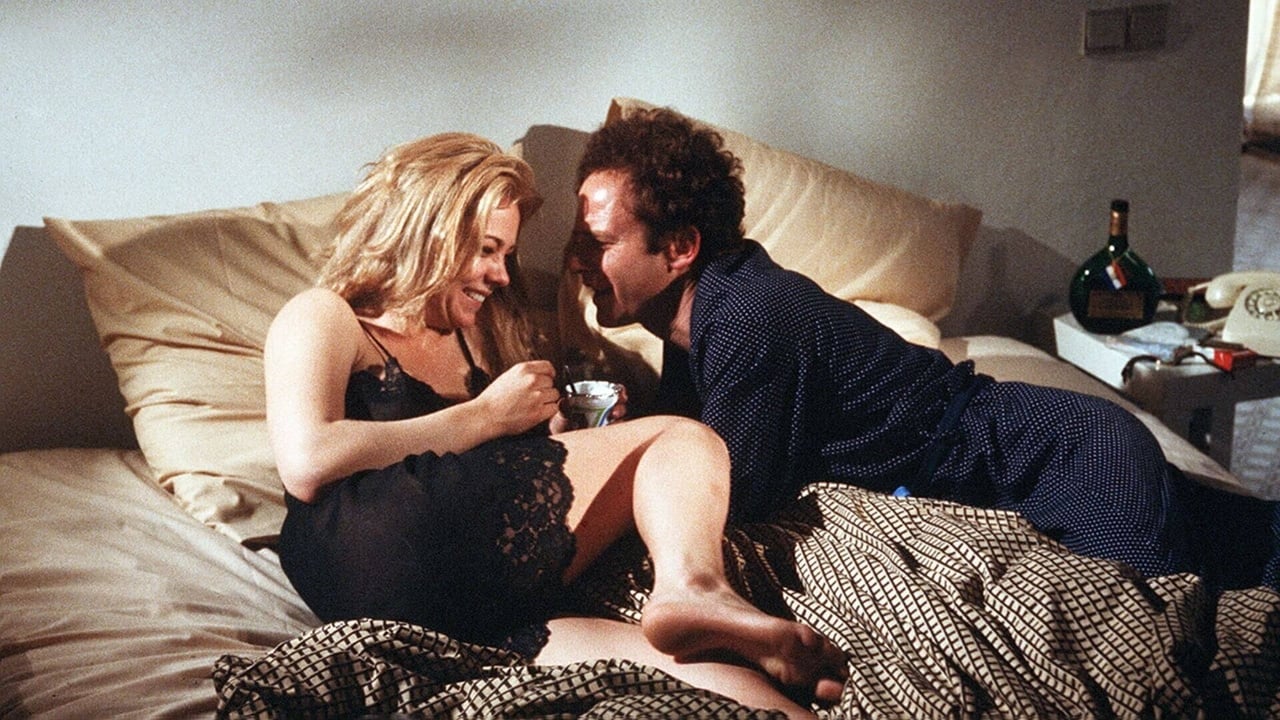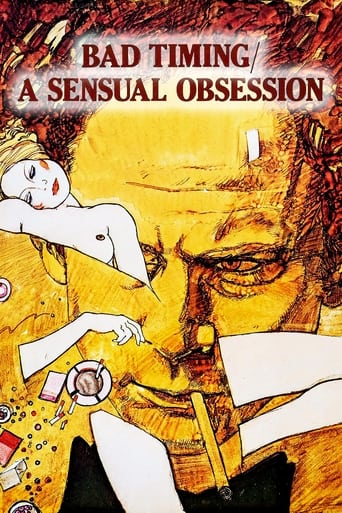ThiefHott
Too much of everything
Doomtomylo
a film so unique, intoxicating and bizarre that it not only demands another viewing, but is also forgivable as a satirical comedy where the jokes eventually take the back seat.
Dirtylogy
It's funny, it's tense, it features two great performances from two actors and the director expertly creates a web of odd tension where you actually don't know what is happening for the majority of the run time.
Nicole
I enjoyed watching this film and would recommend other to give it a try , (as I am) but this movie, although enjoyable to watch due to the better than average acting fails to add anything new to its storyline that is all too familiar to these types of movies.
ags123
Bad script, bad acting, bad directing. The list goes on and on (so does the movie, for more than two hours). No depth to these unsympathetic characters. Everyone smokes nonstop. Poor attempt at erotic overtones. Just nothing to recommend this snooze fest. Theresa Russell and Art Garfunkel can't act their way out of a paper bag. I suggest covering your head with one before watching this mess. And Criterion had the audacity to dignify this film?
lasttimeisaw
Nicolas Roeg's little-circulated relationship dissertation between an American psychiatrist Alex Linden (Garfunkel) and a young American woman Milena (Russell) in Cold War Vienna has an uncanny and scandalizing paralleled real life happening befalls on its leading actor Art Garfunkel. After its glittering opening sequences of a Gustav Klimt's exhibition, the film starts with an unconscious Milena rushed to the hospital in the middle of the night accompanied by Alex in the ambulance, ostensibly from an overdose, and in reality, during the film's shooting, Garfunkel's then girlfriend Laurie Bird, committed suicide by taking an overdose of Valium in New York, aged 26. With that hindsight, one is prone to understand Garfunkel's sometimes perversely surly and tangibly perturbed state when facing off with either a barnstorming Russell or a probing Harvey Keitel, who plays Inspector Netusil, exerts himself in teasing out the truth out of a buttoned-up Alex, as the film's title refers, the timing of Alex's recount about the incident doesn't comply with the physical facts (car radio, Milena's state, etc.).Predominantly, Roeg expertly expounds Alex and Milena's torrid affair by punctuating its aftermath story-line with stacks of flashback in a random arrangement, from the starting point when Milena says farewell to her much older Czech husband Stefan Vognic (Elliott) in the Czech/Austria border, to the pair's encounter, dating, a Northern Africa vacation (prompts Alex's proposal of marriage), to the toxic disintegration due to their incongruity (Lüscher's color test Vs. Paul Bowles' The Sheltering Sky, are the obvious visual pointers). It seems that it is Alex who breaches his work ethic to strike the romance with his client in the first place, then we are repeatedly subjected to the disappointment of Alex's incompetency of his own profession, his botched attempt to understand a freewheeling Milena's psychological status, which can be encapsulated in one sentence (I'm paraphrasing here) "to love a woman tremendously, to love her more than one's own dignity", a pitfall hounds most men in our patriarchal society. But meanwhile, Roeg and screenwriter Yale Udoff also show up the mercurial side of Milena's persona, she professes to be a free-spirited soul, morally unattached, physically liberated, but more often than not, she is the one who backslides into pestering Alex after their breakup, which trenchantly confounds that very statement. It is a self-destructive game which takes two to tango, a woman's congenital insecurity meets a man's unrelieved self-regard, that's what Roeg rams home to us albeit his very distracting M.O. Honestly, it is a mind-bending journey, strewn with zeitgeist reflecting tunes (Billie Holiday, Tom Waits, The Who and counting), where the two leads engaging in graphic sexual acts (and they are nowhere near aesthetically pretty), or exchanging their thoughts in soft-focus treatment. Meantime, the apparently persisting investigation from Netusil, eventually reaches its lurid conclusion without ever sweetening the pills, it nails the psychological nitty-gritty in the face of its morally repugnant revelation. BAD TIMING, a pertinent name for its own ill-fated reception upon its release, is a well- accomplished, counter-cultural, innately honest examination on the caprice, intransigence, and ambivalence of modern relationship and sex philosophy, powered by strong performances, in particular, a spontaneously ravishing Theresa Russell.
tedg
Love is internal. It is sustained by questions of doubt, tension, expectation. The solidity of the hand is strengthened by the slipperiness underfoot.So suppose you wanted to make a film about the fields that animate your anchor relationships. You couldn't do what everyone else does: deal with the tokens: the looks, the physical moving away of bodies and then re-entering. You want it to have the passion it deserves, which is a tricky thing: the passion in the relationships between the film and the viewer has to be based on the same field of passion between lovers. That field requires faith to overcome doubt. This need for investing in love as a counter to the doubts about love is what drives us, with religion and tribalisms as mere side effects.Roeg wanted to do this. During a certain sweet spot in his career, he could shape any story into this, a story about what makes story. And to do it all by cinematic misdirection. This isn't "Last Year at Marienbad," which is abstract. This is internal, subconscious, but with the real fleshy stuff we actually dream in.Some viewers will think this is a simple detective story. Bad guy lies; insistent detective catches him. It is all about sequence, the "timing" of the title. What happens first; how the thing is "explained."But I believe this is something much more important. Like Roeg's other films, these are dreams. The things that happen here — that we see — drift close to what actually happens, and then away being more like imagined fears. It is all about urges; the grandest passions rest on a collection of urges, most of which slip into uncontrollable futures.I will advise you to approach this as something that goes on in the character's soul. Polanski and Kiesloswki have the same relationship to reality, but here we work closer to image and the uncontrollable ends. The overall shape of thing is a love affair, one that is deep and all-consuming. The hero/filmmaker's mind has some tools that allow us to enter the world of dreams:— He is a "research psychoanalyst" in Vienna. This is the most unlikely of cities for intellect, and even today produces ideas that fold in on themselves in tightly wound ways. Roeg quotes "The Third Man" a bit, and assembles a number of Austrian artifacts, all having something to do with control. It is Wittgenstein in his first period.— He is a spy. He lectures about spies. He spies on patients as a theorist of obsession. He literally works for a spy agency, spying on the woman, who in other identities he is falling in love with. This is Wittgenstein in his second period, having renounced the genius of his knotted mind and theories of word play as mazes.— He is a detective, instanced as a second being, a sort of "Fight Club" alter ego that examines himself from the outside. This is Wittgenstein in his third, suicidal period, where his work was on himself. He literally builds a container, a house, here a film. Harvey Keitel since Taxi Driver understood the idea of playing and imagined other. Garfunkle's cluelessness as a person and actor is overwhelmed by him, just as that part of the character's mind is.These three fight for control of self over a woman. The film is so effective, and so energetically unsprung that there is a fourth layer outside. Roeg himself developed an obsession over this woman, falling deeply in love with her. (He would marry her.) The visual storytelling, the editing, the timeshifting, the identity swapping, the depth of texture could not have been as effective were he not obsessively in love in the three ways of the doctor.The genius of starting with Tom Waits and ending with Jarrett's Koln concert is by itself enough to make this an essential experience.Ted's Evaluation -- 4 of 3: Every cineliterate person should experience this.
jaibo
Nicolas Roeg anatomises a love affair, and then re-arranges the pieces to create an affective display. The film is visceral, poetic, dizzying and provocative, moving, sexy and repulsive by turns. It features brilliant performances from all of the cast, most notably Russell - few actresses can achieve the kind of freewheeling and real sensuality that she achieves so seemingly effortlessly here.Set mostly in Vienna, the film takes the psychologists need to control and coral the instincts and life force of a living human woman to be ultimately murderous. One is never quite sure whether Harvey Keitel's detective is a manifestation of guilt and the super-ego or a real on-the-trail policeman; in the end it doesn't matter, as the man in question is forced to face his own reality as a life-denying entity.The ending, as with Performance, shows a fragile human consciousness being driven off to their doom in a car which appears to be the manifestation of a post-modern world in which they are desperately lost.

